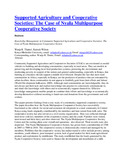| dc.description.abstract | Community Supported Agriculture and Cooperatives Societies (CSACs) are envisioned as model vehicles to building and developing communities, especially in rural areas. They are models in preserving and developing local food production systems, protecting the environment and eradicating poverty in support of the notion and general understanding, especially in Kenya, that farming as a business should support a middle level lifestyle. Despite the fact that most rural communities in Africa, especially in Kenya, are the producers of products that are consumed by urban dwellers, these communities do not appear to fruitfully gain from their efforts and labour (World Development Indicators, 2009). Although rural communities are knowledgeable, they do not always put their tacit and explicit knowledge into practice to consciously communicate to, and share this knowledge with others and to economically support themselves. Effective knowledge management enables people to combine their efforts and knowledge to economically develop themselves without resorting to hand-outs and donations from the government and well wishers.
This paper presents findings from a case study of a community-supported cooperative society. The paper describes how the Nyala Multipurpose Cooperative Society has successfully functioned as the vehicle for social and economic development in a rural community in Central Kenya using funds originally contributed by the members and later raised from milk sales. The cooperative society has also served as a civil society organisation. Data was collected through interviews with key members of the cooperative society and the youth. Families were visited, interviewed and their dairy activities observed. The Nyala Multipurpose Cooperative Society Centre and the cooling plant were visited and operations also observed. Their records were also inspected. The Nyala Multipurpose Cooperative Society has grown from a membership of 2700 in 2005 to 7000 in 2010. The cooperative society is democratically owned and managed by its members. Problems that the cooperative society has endeavoured to solve include poverty among members, youth idleness, poor transport system, lack of good market for their main agricultural product and exploitation by middlemen. The study established that the funds generated by the Nyala Cooperative Society were used to finance the development and installation of a milk
cooling plant. The Nyala Multipurpose Cooperative Society is a model that offers useful insight and successful elements that have focused on milk production. | en_US |

